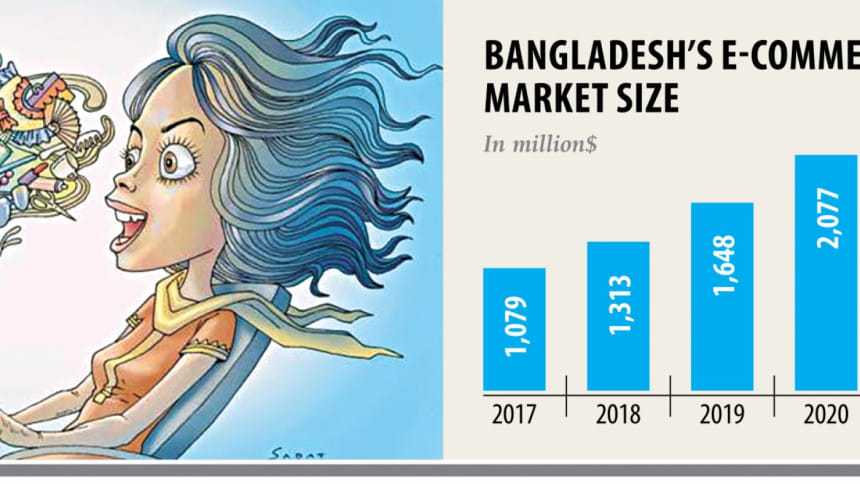E-commerce sales to reach $3b in 4 years

Bangladesh’s e-commerce market stands at $1.6 billion currently and will double to $3 billion by 2023 on the back of a digital foundation laid down by the government and a young and tech-savvy population, a German research firm said recently.
In terms of e-commerce revenue, Bangladesh is ranked 46th in the global ranking, according to Statista, the online portal for statistics that makes available data collected by market and opinion research institutes and that derived from the economic sector and official statistics.
Market players, however, were divided over the findings of the report.
Razib Ahmed, founding president of the e-Commerce Association of Bangladesh (e-CAB), welcomed the report, saying the figure the German firm came up with is credible.
“Thanks to my connection to a large group of online businesses, I see that the market size has already crossed $1 billion-mark and this has now been acknowledged by an international agency,” he said.
However, Fahim Mashroor, chief executive officer of AjkerDeal.com, one of the popular e-commerce sites, contradicted the Statista figure, saying the market size would be a maximum $500 million.
“Maybe, the market has the potential but right now this is an overestimation,” said Mashroor, a former president of the Bangladesh Association of Software and Information Services.
However, he acknowledges that online shopping has grown tremendously in recent times.
The e-commerce market encompasses the sale of physical goods via a digital channel to an end-user. Purchases via desktop computers and mobile devices, such as smartphones and tablets are also included.
Industry players say the growing smartphone penetration with 4G network and rising purchasing power of consumers are propelling the e-commerce industry across the world, and Bangladesh is not out of the market.
Ahmed, a community leader of Facebook in Bangladesh, said the industry should be thankful to the Information Communication Technology Division for its enormous support extended to the sector in the last five years.
According to the Statista report, the online fashion market in Bangladesh is currently worth $598 million and it has the prospect to reach up to $1.24 billion by 2023.
Electronic products amounting to $457 million and furniture and appliances worth about $196 million are sold online.
The online sales of furniture and appliances will would go up to $352 million after four years.
Online sales of toys and hobby products stand at $260 million and it can almost be double to $442 million by 2023.
Ahmed, who heads the Women and e-Commerce Forum, a Facebook platform that promotes local products, said many of the local e-commerce industry may not accept the Statista numbers.
Some people also try to hide the reality in order to get tax benefit from the government, he said.
He said thousands of women entrepreneurs now run businesses through Facebook and handle hundreds of crores of taka.
Some online shop owners only consider selling physical goods as e-commerce. In reality, services such as rideshare, app-based food delivery, and e-ticketing are all part of e-commerce.
Calling doctors and other medical professionals home using online platforms and buying medicines and taking delivery are also very much part of e-commerce, he said.
“People don’t consider online sales of brands such as Aarong, Walton and Samsung as e-commerce and that’s why their estimate is very conservative,” Ahmed said.
However, e-CAB leaders say the e-commerce market is not more than Tk 3,000 crore, $350 million, with 50,000 deliveries daily.
The United Nations sees Bangladesh as a fertile ground for e-commerce growth.
“Bangladesh is fertile ground for e-commerce to take root and benefit companies and consumers alike,” said Shamika N Sirimanne, director of technology and logistics at the United Nations Conference on Trade and Development (UNCTAD), in July this year.
Bangladesh has laid down an exemplary digital foundation and is striving to prepare its citizens for the digital future, an UNCTAD assessment of the country’s readiness to engage in e-commerce shows.

 For all latest news, follow The Daily Star's Google News channel.
For all latest news, follow The Daily Star's Google News channel. 



Comments